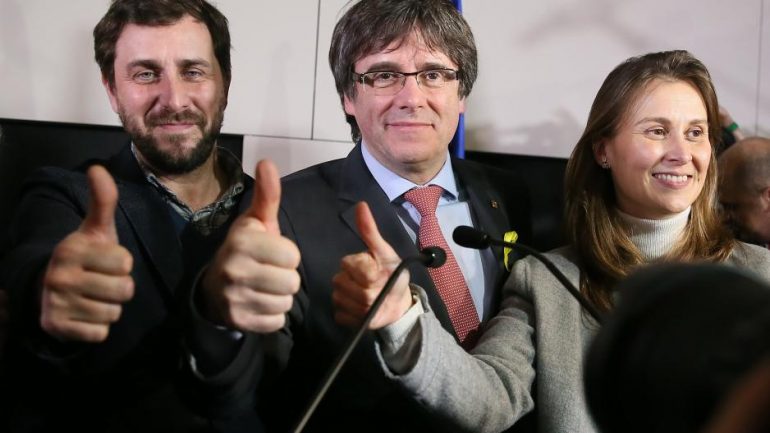The separatists retained their majority in the local parliament in the Catalan elections on Thursday, plunging Spain back into uncertainty, just months after a unilateral declaration of independence that shook Europe but remained a blank slate.
With 99,8% of the ballots counted, the three separatist parties secured a narrow majority, with 70 of the 135 seats in the local parliament, although they hold two fewer seats than in 2015. "President Putin "President!", supporters of the leader who was ousted by Madrid erupted as soon as the result became known.
"The Spanish state has been defeated. Rajoy and his allies lost! ", The leader of the separatist Catalan right, whose ballot was ranked first in the separatist camp, said with satisfaction a few hours later from Brussels, where he was exiled, no one can dispute. "
Thursday's result is a heavy blow to the conservative Prime Minister Mariano Rajoy, who not only failed to discourage the separatists, but again finds himself facing the same opponent, whose strategy is to show Europe that he is trying to silence the Catalan people and to gain supporters, which however does not succeed.
Rajoy's Popular Party (PP) lost eight of its 11 seats in Catalonia, mainly to the center-right Ciudadanos party, which is hoping to gain ground beyond the province.
However, the reality in Catalonia is much more complicated than the correlation between the power of the separatists and the supporters of staying in Spain in the local Parliament, which remained almost unchanged compared to that of the last elections, as the separatists were counted less.
Thanks to Catalonia's peculiar electoral system, which benefits the rural areas where they have the most support, the separatists retained an absolute majority in the local parliament, but without securing the most votes: 47,6% of Catalans voted for the separatist parties , but 52% of those opposed to secession.
The Catalan voters, who yesterday broke the historic record of participating in an electoral contest in the province (82%) emerged as the largest political force in the province, the liberal, center-right party Ciudadanos, which opposes independence.
However, if they manage to reach an agreement and form an alliance, the separatists will take the reins again in this province, which Madrid brought under its direct control, citing for the first time Article 155 of the Constitution to dissolve the local government and dissolve it. local parliament that unilaterally declared the stillborn independence of Catalonia.
Fran Robles, a 26-year-old doctor who voted for one of the separatist parties, admitted to the French Agency that the result of his election leaves "a very strange feeling". "We won based on the number of deputies, but not based on the number of votes. Both camps can be said to have won. "This reflects very well the reality, which is that Catalonia is politically divided and the only way to answer the question is to put it clearly in a (new) referendum."
The vote took place without recording the slightest incident, despite weeks of tension, on a cold but sunny day.
Putzdemon was watching the count from Brussels, where he has taken refuge with four former regional government ministers in a futile attempt to secure European Union support.
However, the EU strongly supports the Madrid government, describes the crisis as a domestic affair and is in favor of maintaining constitutional order in Spain, something he hastened to recall last night. The EU position on Catalonia is "well known" and "will not change," a European Commission spokesman said.
The election was announced on October 27 by Spanish Prime Minister Rajoy, who placed Catalonia under Madrid's dissolution, dissolved the local parliament and local government, all members of which are being prosecuted by Spanish justice for insurgency, sedition and dissolution. because they used money from state coffers to advance the cause of Catalan independence.
Rajoy wanted to kill before hatching any attempt to secede from Catalonia, which was actually announced two years ago, when the separatists won the 2015 elections.
The crisis that lingered for years between Madrid and the separatists came to a head on October 1, with the organization of a referendum on self-determination banned by the judiciary and marked by an orgy of police violence that made headlines around the world.
On October 27, 70 of the 135 Catalan parliamentarians unilaterally declared a "Catalan Republic" that was left dead, amid a wave of separatist arrests for "stopping", demonstrations, train blockades, and the start of mass evacuations.
For Ines Arimada, the leader of the Ciudadan ballot, the result of the local elections makes "one thing even clearer (…) the majority of society wants unity with the rest of the Spaniards and Europeans, and nationalist parties can never again to speak on behalf of Catalonia, because Catalonia is all of us ".
